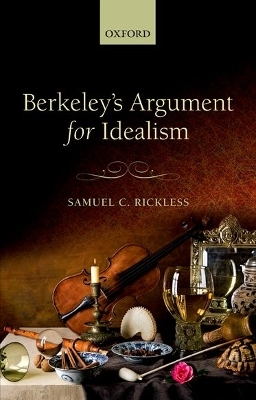
Berkeley's Argument for Idealism
Oxford University Press (Verlag)
978-0-19-877758-8 (ISBN)
Samuel C. Rickless presents a novel interpretation of the thought of George Berkeley. In A Treatise Concerning the Principles of Human Knowledge (1710) and Three Dialogues Between Hylas and Philonous (1713), Berkeley argues for the astonishing view that physical objects (such as tables and chairs) are nothing but collections of ideas (idealism); that there is no such thing as material substance (immaterialism); that abstract ideas are impossible (anti-abstractionism); and that an idea can be like nothing but an idea (the likeness principle). It is a matter of great controversy what Berkeley's argument for idealism is and whether it succeeds. Most scholars believe that the argument is based on immaterialism, anti-abstractionism, or the likeness principle. In Berkeley's Argument for Idealism, Rickless argues that Berkeley distinguishes between two kinds of abstraction, 'singling' abstraction and 'generalizing' abstraction; that his argument for idealism depends on the impossibility of singling abstraction but not on the impossibility of generalizing abstraction; and that the argument depends neither on immaterialism nor the likeness principle. According to Rickless, the heart of the argument for idealism rests on the distinction between mediate and immediate perception, and in particular on the thesis that everything that is perceived by means of the senses is immediately perceived. After analyzing the argument, Rickless concludes that it is valid and may well be sound. This is Berkeley's most enduring philosophical legacy.
Samuel C. Rickless is Professor of Philosophy at the University of California, San Diego. Educated at Harvard (BA, 1986) and Balliol College, Oxford (BPhil 1988), he earned his PhD in philosophy at the University of California, Los Angeles, in 1996. After five years of teaching at Florida State University, he joined the UCSD philosophy department in 2001. He is the author of Plato's Forms in Transition (CUP, 1997), and articles on a variety of subjects in the history of philosophy, including Socrates' theory of virtue; Plato's theory of forms; Plato's method of definition; the Cartesian Circle; early modern theories of primary and secondary qualities; Locke's theory of knowledge, rejection of innate ideas, and philosophy of action; Hume's account of the passions; and Kant's argument for the Categorical Imperative. His research interests extend to normative ethics, constitutional law, and philosophy of language. He is at work on a book on Locke for Wiley-Blackwell's Great Minds series.
Introduction
1: Mediate and immediate perception
2: The perception of sensible objects
3: The argument for idealism in the Principles
4: The argument for idealism in the first Dialogue
Conclusion
Bibliography
Index
| Erscheinungsdatum | 01.09.2016 |
|---|---|
| Verlagsort | Oxford |
| Sprache | englisch |
| Maße | 136 x 216 mm |
| Gewicht | 289 g |
| Themenwelt | Geisteswissenschaften ► Philosophie ► Erkenntnistheorie / Wissenschaftstheorie |
| Geisteswissenschaften ► Philosophie ► Geschichte der Philosophie | |
| Geisteswissenschaften ► Philosophie ► Metaphysik / Ontologie | |
| Geisteswissenschaften ► Philosophie ► Philosophie der Neuzeit | |
| ISBN-10 | 0-19-877758-2 / 0198777582 |
| ISBN-13 | 978-0-19-877758-8 / 9780198777588 |
| Zustand | Neuware |
| Haben Sie eine Frage zum Produkt? |
aus dem Bereich

![Was heißt Denken?. Vorlesung Wintersemester 1951/52. [Was bedeutet das alles?] - Martin Heidegger](/media/113619842)
